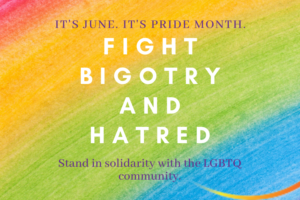A blog post explaining how both people following rights and responsibilities makes an equal, healthy, safe relationship.
Boundaries are the limits and rules you have for your interactions with others, and how you want to be treated in a relationship. They can be boundaries regarding sexual or physical actions, emotions or thoughts, finances and materials, or even time. Our boundaries are tested many times by others, and it can be hard to assert your limits when someone is constantly trying to push them.
At Safe+Sound Somerset, we use Rights and Responsibilities as a framework for healthy boundary setting. This framework empowers individuals to clearly state their needs, enforce their limits, and to make decisions that also respect the other partner’s boundaries. Using the rights and responsibilities framework helps to establish a healthy relationship with equal power and control, and provides a clear litmus test for whether or not certain behaviors or actions are unhealthy or abusive.
The rights and responsibilities framework boils down to one main idea – You have a right to be safe, and you have a responsibility to treat your partner safely.
First, let’s look at rights. You always have Relationship Rights in your interactions with your partner (as well as in all types of relationships, including friendships!) These rights can’t be taken away from you or minimized, even if you have made a mistake in the relationship.
Here are some of the most important Relationship Rights:
- You have the right to not be abused – emotionally, sexually, physically, verbally, or financially.
- You have the right to have your own needs be just as important as your partner’s needs.
- You have the right to end a relationship or “fall out of love” with someone.
- You have the right to say, “No” and to change your mind.
- You have the right to have your own opinions, and to safely express them.
- You have the right to take responsibility for your own actions, not someone else’s behavior.
- You have the right to your own friends and interests, to not feel bad about spending time with them, and to grow as an individual and not be criticized for it.
- You have the right to be loved, respected, and live a peaceful life.
The above statements can make it easier to establish your boundaries and maintain your individual power and control. Each can be a complete response. For example, your partner may be asking for your social media login so they can track who you are following. If you say, “No,” and they continue to push you, an appropriate response is for you to inform your partner, “I have a right to say ‘No.’” If they continue to push you, they are violating your right to say no.
Next, perhaps your partner gets angry and hits you. They blame you, saying that if you had just let them look in your phone, they wouldn’t have gotten so angry. In this example, your partner is violating your rights to say “No,” your right to not be abused, and your right to not be blamed for someone else’s behaviors. By understanding your rights, it becomes easier to see when behaviors are unhealthy or unsafe.
Because each person has their own set of rights, Relationship Responsibilities help you consider how your actions impact your partner’s individual power and control. Responsibilities are jobs or something you need to do. They also imply a level of self-awareness and reflection that are an important part of establishing healthy relationships.
In a relationship, here are some of the Relationship Responsibilities:
- You have the responsibility to not abuse your partner.
- You cannot blame anyone else but yourself if you are abusive; you also cannot blame substances.
- You are responsible for your own actions. Your partner is not responsible for your actions, and you are not responsible for your partner’s actions.
- It is your responsibility to understand that the relationship is just one part of both your own and your partner’s life.
- You are responsible for seeking support if you realize you are abusive or being abused.
- You are responsible for your own life.
By adding the responsibilities to the rights, there is now an equal balance of power and control. As an example – we frequently hear survivors say their abusive partner would threaten to hurt themselves or others if they ended the relationship. These threats violate the survivor’s right to end the relationship and not be abused, as well as the partner’s responsibility to not blame others for their actions, to not abuse the partner, and to understand that the relationship is just one part of their lives.
Each of us has power and control over our lives. Rights and Responsibilities can provide the language you need to establish boundaries and build a relationship that is equal, respectful, safe, and beneficial to both partners.
If you or someone you know needs help, call or text our 24/7 hotline at 866.685.1122. For additional information, visit www.safe-sound.org.










